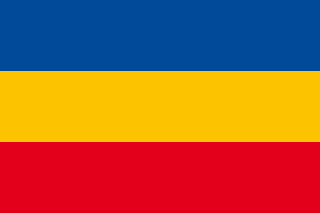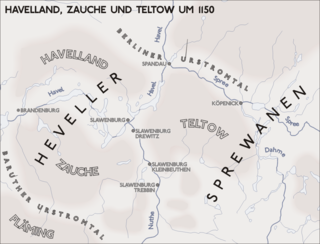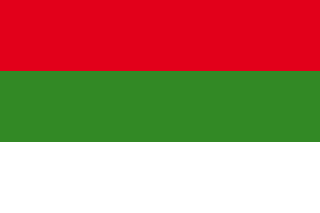
Albert the Bear was the first margrave of Brandenburg from 1157 to his death and was briefly duke of Saxony between 1138 and 1142.
The House of Ascania was a dynasty of German rulers. It is also known as the House of Anhalt, which refers to its longest-held possession, Anhalt.

Brandenburg, officially the State of Brandenburg, is a state in northeastern Germany. Brandenburg borders Poland and the states of Berlin, Mecklenburg-Vorpommern, Lower Saxony, Saxony-Anhalt, and Saxony. It is the fifth-largest German state by area and the tenth-most populous, with 2.5 million residents. Potsdam is the state capital and largest city. Other major towns are Cottbus, Brandenburg an der Havel and Frankfurt (Oder).

The Duchy of Mecklenburg-Schwerin was a duchy in northern Germany created in 1701, when Frederick William and Adolphus Frederick II divided the Duchy of Mecklenburg between Schwerin and Strelitz. Ruled by the successors of the Nikloting House of Mecklenburg, Mecklenburg-Schwerin remained a state of the Holy Roman Empire along the Baltic Sea littoral between Holstein-Glückstadt and the Duchy of Pomerania.

Brandenburg an der Havel is a town in Brandenburg, Germany, which served as the capital of the Margraviate of Brandenburg until it was replaced by Berlin in 1417.

The Altmark is a historic region in Germany, comprising the northern third of Saxony-Anhalt. As the initial territory of the March of Brandenburg, it is sometimes referred to as the "Cradle of Prussia", as by Otto von Bismarck, a native of Schönhausen near Stendal.

The Northern March or North March was created out of the division of the vast Marca Geronis in 965. It initially comprised the northern third of the Marca and was part of the territorial organisation of areas conquered from the Wends. A Lutician rebellion in 983 reversed German control over the region until the establishment of the March of Brandenburg by Albert the Bear in the 12th century.

Polabian Slavs, also known as Elbe Slavs and more broadly as Wends, is a collective term applied to a number of Lechitic tribes who lived scattered along the Elbe river in what is today eastern Germany. The approximate territory stretched from the Baltic Sea in the north, the Saale and the Limes Saxoniae in the west, the Ore Mountains and the Western Sudetes in the south, and Poland in the east.

The Hevelli or Hevellians/ Navellasîni were a tribe of the Polabian Slavs, who settled around the middle Havel river in the present-day Havelland region of Brandenburg in eastern Germany from the 8th century onwards.

The Margraviate of Brandenburg was a major principality of the Holy Roman Empire from 1157 to 1815 that, having electoral status although being quite poor, grew rapidly in importance after inheriting the Duchy of Prussia in 1618 and then came to play a pivotal role in the history of Germany and that of Central Europe as core of the Prussian kingdom.

The Principality of Anhalt was a State of the Holy Roman Empire, located in Central Germany, in what is today part of the federal state of Saxony-Anhalt.
Otto I was the second Margrave of Brandenburg, from 1170 until his death.
Conrad I, called the Great, a member of the House of Wettin, was Margrave of Meissen from 1123 and Margrave of Lusatia from 1136 until his retirement in 1156. Initially a Saxon count, he became the ruler over large Imperial estates in the Eastern March and progenitor of the Saxon electors and kings.
Dietrichof Haldensleben was a count in the Schwabengau, later also in the Nordthüringgau and the Derlingau, who was the first Margrave of the Northern March from 965 until the Great Slav Rising of 983. He also bore the title of a dux (duke) in contemporary sources.He was a ancestor of John V
Pribislav, Przibislaus is a Slavic origin name. Its feminine form is Pribislava.
Starting in the 12th century, the Margraviate, later Electorate, of Brandenburg was in conflict with the neighboring Duchy of Pomerania over frontier territories claimed by them both, and over the status of the Pomeranian duchy, which Brandenburg claimed as a fief, whereas Pomerania claimed Imperial immediacy. The conflict frequently turned into open war, and despite occasional success, none of the parties prevailed permanently until the House of Pomerania died out in 1637. Brandenburg would by then have naturally have prevailed, but this was hindered by the contemporary Swedish occupation of Pomerania, and the conflict continued between Sweden and Brandenburg-Prussia until 1815, when Prussia incorporated Swedish Pomerania into her Province of Pomerania.

In the Slavic revolt of 983, Polabian Slavs, Wends, Lutici and Obotrite tribes, that lived east of the Elbe River in modern north-east Germany overthrew an assumed Ottonian rule over the Slavic lands and rejected Christianization under Emperor Otto I.

John I, Margrave of Brandenburg was from 1220 until his death Margrave of Brandenburg, jointly with his brother Otto III "the Pious".

Jaxa of Köpenick was a prince of the West Slavic Sprevan Principality of Copnic. He was an opponent of Albert the Bear during the formation of Brandenburg in 1157.

Max Unger was a German sculptor.














